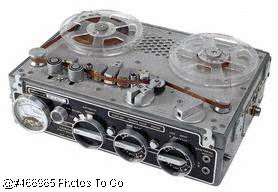Audio's one of my favorites. I've done a lot of music television over the years and had a chance to
sit at the feet of the MTV masters Robert Tercek and Steve Grieder...in an environment under the banner 'creativity rules',
the one thing these guys would never let anyone get away with was half hearted audio. They taught me a lot, some of which
I share below. In music television, MUSIC comes before TELEVISION...first and foremost it turns out. The same rules
apply for every other kind of broadcaster.
With those guys, audio production was the next step after your script. Its a lot easier to cut picture to
sound than the other way around. We're not talking simply cutting to the beat...you didn't have to do that. We're talking
being prepared and getting it right. You had to learn to cut audio in your head, as well as the picture. A very useful skill
to develop. You save time, and thereby save production costs and even at MTV that was very, very important.
MTV was fortunate that they had blanket music deals allowing their promo producers to use just about any
bit of music out there. Most of you won't be in that position. You'll be stuck with library music, sound effects reels, the
audio track from the program you're promotiong...maybe a soundtrack from the movie. It's not that much of a hinderence, really.
It just lowers your choices.
If you are in a music library situation, read the fine print. Find out exactly what you can use, how long
you can use, and what the charges are. If you sample something for a couple of seconds, is there a charge? If you use a drum
beat from one track as a breaker, is there a charge? What can you get away with before your department has to pay. Let's
be clear, I'm not encouraging you to steal music...I'm encouraging you to find out exactly what you have to work with
and build from there. By the way, if you do steal music there's a good chance you'll be found out so be very careful. Unless
you're working in the Philippines or Mainland China, lifting music could find your channel in trouble with the local licensing
authority. And therefore you are in trouble.
If there's a piece of music that you really, really want to use then get in touch with the local label
office. While the music industry if full of record weasels, there are a few good guys out there who may be able to help. Maybe
you can work something out if you promise to credit the song on your spot somehow, or if there's something else you can offer.
Develop a relationship that you may be able to use in the future. These guys are only interested in selling more records,
so there's got to be something you can work out...find ways to help them push their product, barter deals for album commercial
airtime, help them out with an upcoming concert promotion, something...nothing's for free, especially in the music world,
but there are compromises. A friend at a small station in Canada got permission to use a John Lennon track directly from Yoko
Ono. It helped that it was for a good cause PSA, but it wouldn't have happened if he didn't have the balls to ask. So ask.
The ultimate scenario is commissioned music. Finally, you've got a budget. You're making greatness and you
need a great track to make it perfect. Around the planet, there's hundreds (if not thousands) of very good commercial audio
production houses that fit into just as many price ranges. Check around, ask for demo reels, download their samples from the
internet. If its someone you've never worked with before, check 'em out a little bit further. Phone up the producers of the
spots they claim they've done and ask about their work habits...what were they like to work with, did they deliver on
time, did they try to sneak by any hidden charges, was the producer happy with the result. Be sure before you spend. I've
had a few cases in my time where I've seen a friend's work on someone else's demo reel. Bad idea that...the planet
ain't all that big and it will come back to eat you if you do this.
Good audio artists and composers won't lock you into one style. They'll keep things loose enough for bigger
changes before the production is finished. If you've presented them with a storyboard, an animatic, a mood breakdown...it will
be enough to get them started. If you've got someone you're sure of, you may have them working on a guide track before
you're shooting. Very handy for your first editing rough cut. If you have the luxury, experiment around with
the some different music styles for your spot. Once you move into the final mixing stages, you're getting locked in. You'll
be looking for your music supplier to be adding in little bits and pieces here and there...subtle sound effects to highlight
some action, effected audio here and there. Don't be afraid to ask for anything...even if this is your first time. You are
the one paying the bill.
I saw Eddie Chung from 'DRUM' in Hong Kong (one of the best commercial composing houses I've seen by the
way) give a seminar once on this very subject. He showed the stages he went through with a client, agency and production
company in the making of a very expensive :30 spot that had no script, no voice over. Even at that level of production cost there
was a lot of professionalism with a twist of amateurs and egos thrown in from all corners. Didn't look like an easy
job. Eddie took the audience through the composing process, how it worked and what the stages where. Then he showed the spot....5
times...with 5 completely different audio tracks. Classical style, funky, dark and moody, rock, then light. Each and every
one of them were great...they all worked, but they all gave you a completely different feeling for the spot. Then he played
the one done for the client....something completely different again. I was amazed at what this guy brought to the whole production
process and how much an effect he alone could have over the impact of the finished work. But that's what he does for
each and every one of his clients. If you find someone like that in your price range, use them for all they're worth.
Before we get down to the hard details, the last thing I'll touch on is voice overs. Now with ISDN and the
internet, the whole world of voice overs is available to you. They come in all price ranges and some of them (but by all means,
not all of them) are worth the price they ask. With some, you may be able to work out a deal. A friend used the voice-god
Don Fontaine and found him not only to be reasonable when it came to price, but incredibly professional when it came to the
job. He brought in a whole new level to the work, made the spot seem better than great, made everyone (especially
the client involved) very pleased with the result...and all in a very short and painless recording time. This was
from a link up to other side of the planet. The man knew what was required of him, knew what the producer was looking
for, gave him that plus a little bit more and showed exactly why he has the rep he does. Moral of the story,
if you can use a real pro, get a real pro.
But if you're working at a station where part of the weatherman's contract stipulates that he's the only
voice over you can use, you still need to get the best result out of him. I don't care if you hate his guts...it's your job
to get your promo as good as you can get it. And that includes getting the right voice over delivery on your spot.
Voice over artists are human. True, some take it a little too seriously as 'artists'...but all of them
need to know you appreciate their skills. Voices carry inflections, subtleties, emotion...in other words acting...all without
seeing their face. The better they feel during the session, the better the result. If you're v/o isn't too skilled, you
can have a direct effect on them just by the mood you set in the session. If you're in a hurry, moody, unfocused...what do
you think the guy's going to be like? He's human and feeds off you.
- Do not waste your audio time. Listen to all your source material and have a cut list in your head before
you go into session. Do not waste the time listening to CDs and deciding there.




